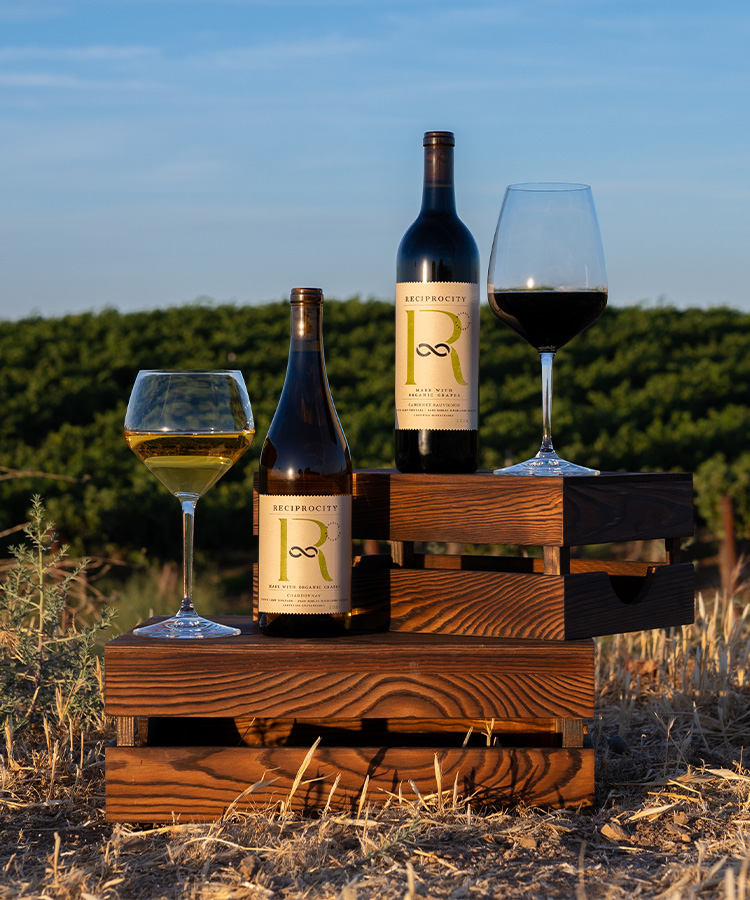
September is National Organic Month and a good time to remember that the choices you make matter.
What you do — and what you drink — really does make a difference, and if you’re searching for a more sustainable way to sip, look no further than Reciprocity, a line of premium organic wines out of Paso Robles that eco-conscious consumers can feel good about.
In 1973, a family of farmers established a vineyard on a lush 1400-acre patch of California Coast, dubbing the property French Camp for the Basque shepherds that once roamed the region. With that, Miller Family Wines was born. With Reciprocity, the Millers are paying homage to their legacy and actively giving back to the very land that they’ve lovingly tended for more than 50 years.
The name Reciprocity is a reference to the symbiotic relationship between the farmer and the land, a partnership founded and focused on the respect that both parties cyclically receive and replenish. In the making of these wines, the Miller Family is proudly and creatively employing materials and practices designed to enable both their company and the earth to grow and flourish.
All Reciprocity wines are made with organic grapes farmed from French Camp, a single, Certified Sustainable vineyard and the second-largest Certified Organic vineyard on the Central Coast of California. It’s here at home where the Miller family has found ways to work with, and for, the land at every point in the winemaking process.
At the growing stage, Miller utilizes specialized tools such lysimeters (which measure soil-water balance and evaluate vitality) and has planted cover crops like vetch and legumes to preserve, protect, and nourish the earth. Efficient lighting and motion detectors have reduced energy use by 57 percent, while a combination of special irrigation methods and careful scheduling have enabled Miller to halve their water usage during the height of harvest. The company also harnesses cutting-edge technology that allows them to capture and dispose of ethanol — a clever investment in cleaner air.
As for the area’s animals, Miller is dedicated to maintaining the region’s biodiversity, eschewing the use of chemical pesticides or herbicides and instead, embracing the presence of native wildlife as a natural form of pest control. Sure, you shouldn’t judge a wine by its bottle, but even Reciprocity packaging (featuring natural cork and partially recycled glass and paper) has been designed to reduce environmental impact, as have their shipping materials — a true testament to the company’s commitment to conservation from soil to shipment.
These are all careful, conscientious decisions made by the Miller Family that collectively serve as a prime example of an organization that’s doing what they can in their own backyard (or in this case, vineyard) to give back. However, while this is local action, the goal is global impact, and the green-minded growers’ commitment to sustainability — one of the company’s core values — extends well beyond the borders of French Camp. In addition to the work they’re doing at home, Miller is paying it forward through their membership with 1% for the Planet, a worldwide network of businesses committed to donating at least one percent of their annual sales to environmental organizations. (In Miller’s case, CCOF, CSWA and SIP, three groups focused on sustainability and caring for the land.)
Of course, satisfying the environmentally-conscious oenophile is about more than sustainability; the wine has got to be good. And it’s no surprise that the Miller Family — one of the Golden State’s most respected winegrowing families with a legacy defined by five generations of California farming — have found the sweet spot where taste and tradition meet excitement and innovation, resulting in a collection of premium, vegan-friendly wines that truly shine.
Let’s start with the Reciprocity reds. The Cabernet Sauvignon is a bright burst of cherries, berries, and roasted hazelnuts, accented by warm spice and soft hints of vanilla. Meanwhile, the Miller Family’s Merlot is a sensory symphony of blackberry, blueberry and violet — dark, jammy, and juicy with earthy undertones and a slight hint of peppery spice. Each serves as a perfect pairing for richer dishes — plates piled with braised or roasted meats, ooey-gooey cheeses and sweet caramelized vegetables. They are also the ideal accompaniments to cheesecake, chocolate mousse, or any other dreamy, decadent dessert.
As for whites, the aromas of the Reciprocity Sauvignon Blanc allude to the tropics, with breezy notes of guava, passion fruit, mango, and pineapple. This is a light wine that also delivers on depth, and makes for a refreshing complement to your favorite seafood dish or a hearty salad enhanced with tangy goat cheese and roasted root veggies. Finally, in the Chardonnay you’ll find toasty notes of brown spice and vanilla alongside a soft and mellow flavor of melon, followed by a burst of citrus on the finish with light touches of tangerine and lemon curd. his is a great glass to pour alongside a more indulgent seafood entree, such as a rich and creamy mac and cheese loaded with chunks of Dungeness crab.
No matter which of the Reciprocity wines you choose, you can’t go wrong. From what might be the country’s best wine region, these are world-class wines that are elegant expressions of the earth’s beauty and bounty. Reciprocity is a result of Miller Family’s craft, care, and commitment — not just to quality product but to the planet and its, our, future.
This is a pledge that’s worthy of raising a glass to this September, and all year long.
This article is sponsored by Reciprocity Wine.


